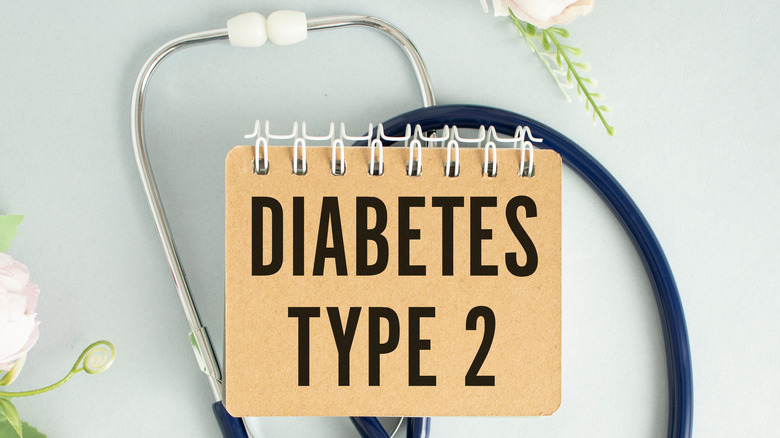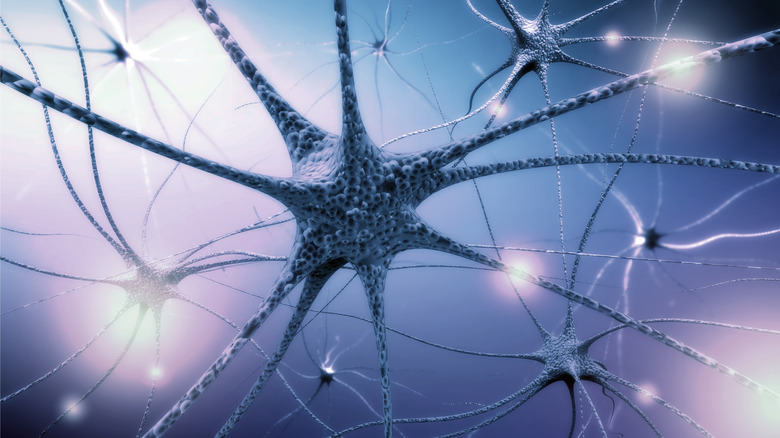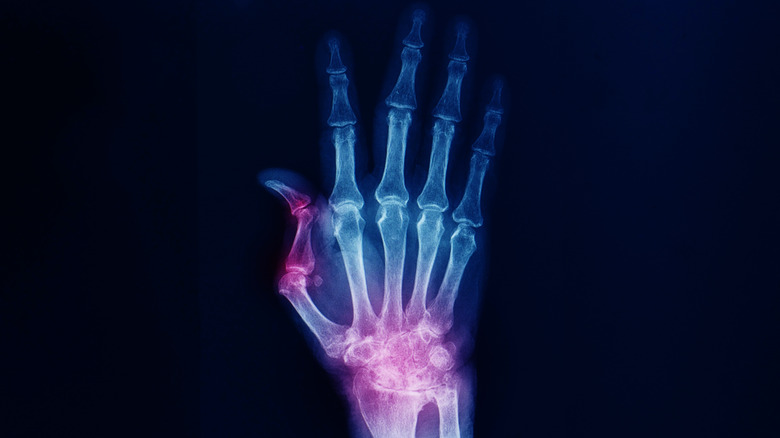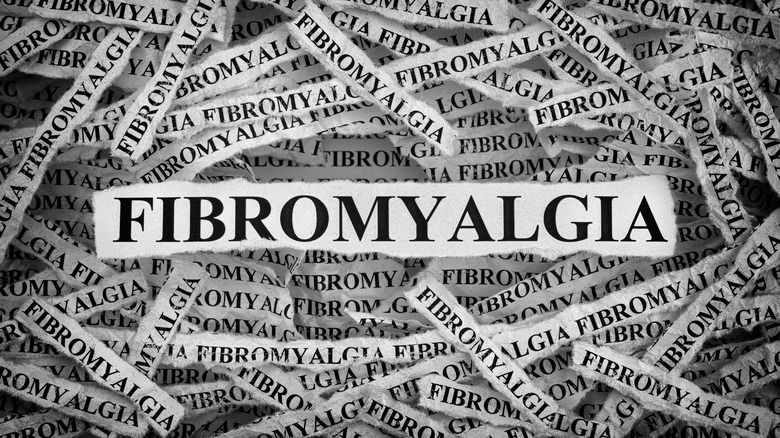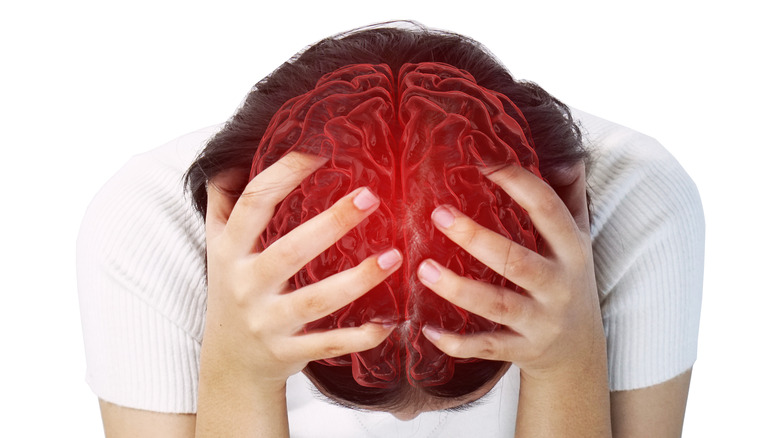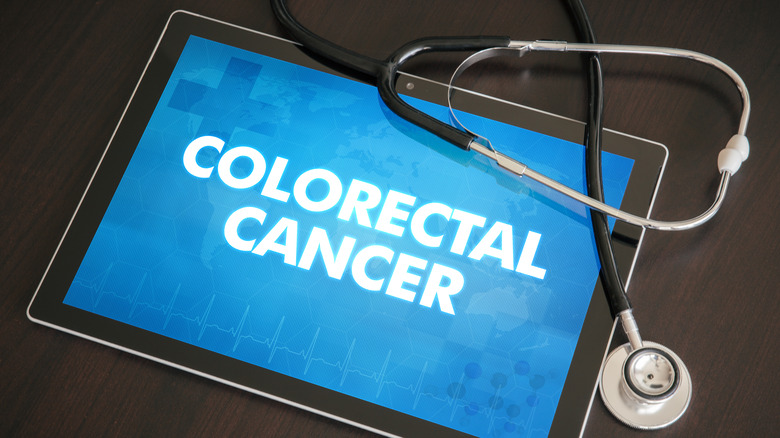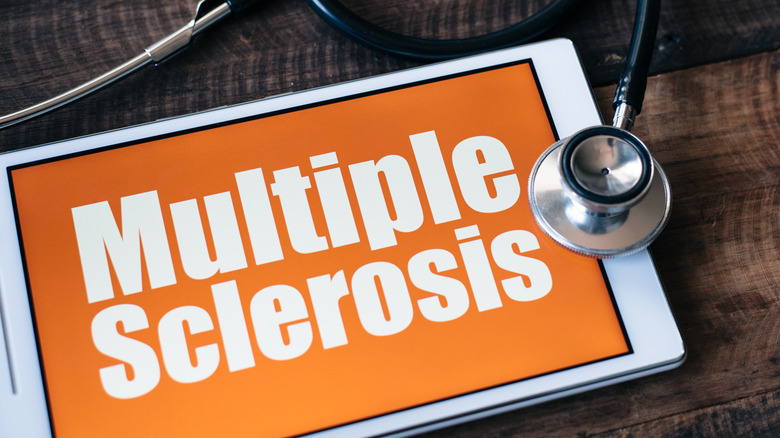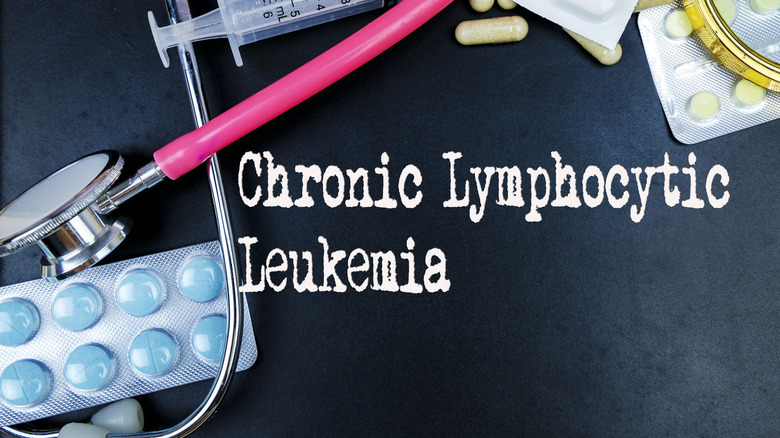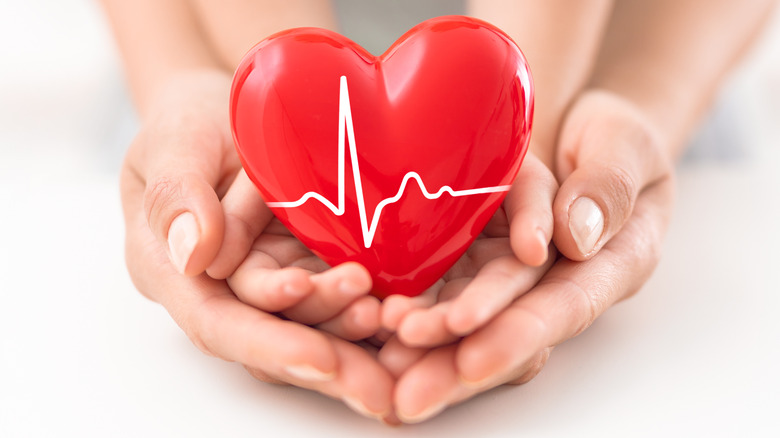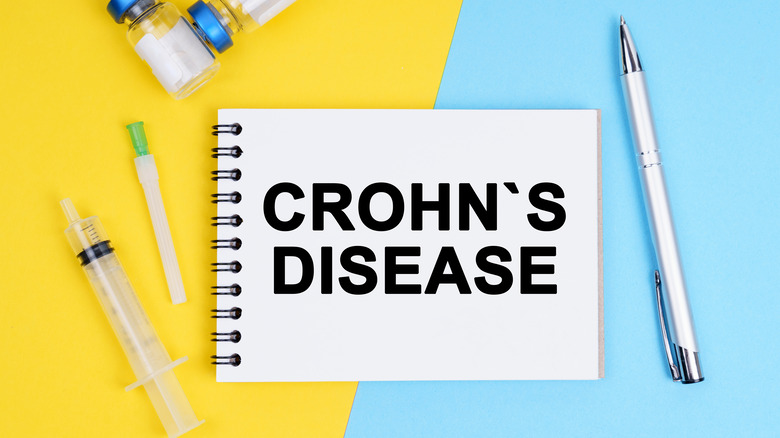Health Conditions That Could Be Making You Tired
Everyone gets tired from time to time. If you get a bad night's sleep, for example, you're going to feel like a zombie the next day. However, that sense of tiredness usually goes away if you take a nap or go to bed earlier the next night. In general, that type of tiredness is nothing to worry about, but that doesn't mean there isn't a feeling of exhaustion you should just excuse.
When you feel tired all the time but there doesn't seem to be an obvious cause, you might be experiencing fatigue (via WebMD). This type of tiredness is far more severe than what you'll feel after a sleepless night. Some describe it as that worn-out feeling after being sick with the flu, and it can interfere with your quality of life. Suddenly, even small amounts of exercise can leave you feeling like you just ran a marathon. If you have children, keeping up with them might feel impossible, or at least more stressful.
When this type of exhaustion happens regularly, we turn inward, thinking unhealthy thoughts like "I'm just lazy" or "I'm old and should give up." The truth is, however, this tiredness could be because of a number of medical conditions.
Type 2 diabetes
Chances are, you've at least heard of diabetes, but are you aware that there is more than one type? For example, a person's body can produce insulin (a hormone that helps process sugar), but not use it as effectively as it should (via Medical News Today). If this happens, the person can develop type 2 diabetes (via American Diabetes Association).
Many diets recommend eliminating or cutting back on sugar, but unfortunately, it's not that easy. If your cells don't take in sugar, two negative things can happen. First, the excess sugar will remain in your bloodstream and circulate throughout your body, where it can do damage. Second, your cells need a certain amount of sugar to create energy for your body. A person with type 2 diabetes can experience fatigue, simply because their cells cannot properly absorb a key ingredient for generating energy.
Aside from complications linked to how their bodies use insulin, type 2 diabetics might also experience extreme tiredness because of low blood sugar levels, which can occur after taking diabetes medication (via Medical News Today). In addition, feeling fatigued can be a warning that a type 2 diabetic has nerve damage, kidney failure, an infection, and/or heart disease. For this reason, it's important to let your healthcare provider know if you're constantly feeling tired.
Postural orthostatic tachycardia syndrome
Postural orthostatic tachycardia syndrome (POTS) is not only is a common culprit behind extreme tiredness, but also one that often flies under the radar (via Johns Hopkins Medicine). In other words, even a well-trained medical professional may not recognize a case of POTS.
Part of the reason might be because there is still a great deal about POTS that we don't understand yet. As physical medicine and neuromuscular specialist Dr. Tae Chung explains to Johns Hopkins Medicine, POTS affects the part of our nervous system that takes care of the bodily functions that happen without us thinking about them. For example, you can control if you raise your arm above your head, but you can't control whether or not you sweat. POTS, however, causes that branch of your nervous system to malfunction, which can lead to circulatory issues. However, why this malfunctioning occurs and why it causes fatigue is still up for debate.
Although POTS can be difficult to diagnose, there are some symptoms that might be red flags of this ailment. For example, Dr. Chung describes the type of fatigue someone could experience with POTS as "... probably hundreds of times worse than your worst flu." The person might also feel faint, shaky, and dizzy, especially when they're in a standing (rather than a sitting or reclining) position.
Rheumatoid arthritis
Some of us take our bodies for granted. We do things like pick up our phones, type, or walk around a store without considering how many bones and muscles are involved to do these simple tasks — that is, until something goes wrong. Case in point, rheumatoid arthritis (RA) can cause our joints to become swollen and painful (via Everyday Health). Suddenly, those everyday activities become greater challenges. The condition also comes with chronic fatigue, a less discussed but prominent symptom of RA.
RA fatigue is similar to the extreme exhaustion commonly associated with the tail-end of the flu. "It is a systemic type of exhaustion, meaning it affects your whole system instead of just a certain body part," Yousaf Ali, the chief of the division of rheumatology at Mount Sinai West Hospital, told Everyday Health.
So, why does this unique type of exhaustion happen? Part of it could be because RA fatigue makes it more difficult to exercise, which perpetuates that tired feeling (via Everyday Health). It also could be that the inflammation caused by RA affects the brain, leading to chronic exhaustion. Just having RA can be mentally and emotionally taxing, which can zap your energy. This is why you should never just shrug off RA as something inevitable that comes with age or any other reason.
Fibromyalgia
Like so many conditions, we are still learning about fibromyalgia (via Healthline). What we do know has more to do with its symptoms than its causes. For example, we understand that a person with fibromyalgia experiences pain throughout their body, which may or may not be because it is reacting too strongly to the pain. Even with these gaps in our knowledge, we do recognize that extreme levels of exhaustion and fibromyalgia can go hand-in-hand.
According to Healthline, the type of fatigue that comes with fibromyalgia has some key characteristics. For starters, it's a type of tiredness that affects someone physically, emotionally, and mentally. A person experiencing fibromyalgia-related exhaustion might have a hard time focusing. They also might feel depressed and unmotivated. Additionally, they could feel as tired as if they just did a high-intensity workout. In addition, getting a good night's sleep does not restore their energy levels. It's not uncommon for someone with fibromyalgia to have insomnia, which can compound feelings of fatigue.
So, what is the direct connection between fibromyalgia and fatigue? Again, we haven't connected all the dots. However, a possible reason is pain can be exhausting for your body, so amplified pain might result in amplified levels of exhaustion (via Healthline). With that said, there are ways to lessen fatigue caused by fibromyalgia, like managing stress, exercising, and adjusting your diet. However, always speak with a health care professional before making any lifestyle changes.
Hypothyroidism and hyperthyroidism
It's easy to mix up hypothyroidism and hyperthyroidism. After all, there's only a two letter-difference between these medical terms. However, they are medically complete opposites (via Verywell Health). Despite this, both can be sources of extreme fatigue that isn't relieved by sleep.
According to Verywell Health, hypothyroidism is when your thyroid is sluggish, which in turn, makes the rest of you sluggish. While many of us might hit the snooze button a couple of times before starting our day, someone with hypothyroidism might find it hard to drag themselves out of bed. Even when they do get themselves going, they'll probably need naps just to keep themselves going.
On the other hand, hyperthyroidism is when your thyroid becomes your body's overachiever and, in the process, causes health problems like anxiety and insomnia. Just like hypothyroidism, hyperthyroidism can leave you feeling extremely tired, as well as elevate your pulse rate and blood pressure. In addition, it can cause diarrhea and uncontrollable trembling.
If you suspect your thyroid is behind your extreme tiredness, contact your healthcare provider right away. It is possible to better manage your symptoms with the right treatment (via Verywell Health). Remember, exhaustion can be your body's way of signaling to you that something is wrong, but only a medical professional can properly diagnose conditions, like hyperthyroidism and hypothyroidism.
Post-concussion syndrome
It's important to be a bit blunt about this next possible cause of extreme tiredness. According to the Mayo Clinic, a concussion is a type of traumatic brain injury — a mild form of it, yes, but still a traumatic brain injury. In other words, even a small concussion needs to be taken seriously. This due diligence means watching for fatigue and other symptoms of post-concussion syndrome.
As the Mayo Clinic explains, post-concussion syndrome can occur within a week of the concussion and last more than a year after the concussion takes place. Symptoms include exhaustion, vision and hearing problems, memory issues, anxiety, and dizziness. They can all start long after the concussion happens. According to the Mayo Clinic, post-concussion syndrome-related symptoms can happen, even if the person only has a minor concussion.
Aside from fatigue, post-concussion syndrome can cause migraine-like headaches and sleep issues (via Mayo Clinic). In addition, it can affect one's senses of smell and taste, although this is not a common occurrence. If you experience a head injury, do not self-diagnose it as no big deal. Instead, consult a medical professional right away. If you do have a concussion, you might want to schedule follow-up appointments weeks, months, and even a full year after your injury.
Colorectal cancer
Even though "large intestine" doesn't appear in its name, colorectal cancer does involve 2 key parts of your large intestine: your colon and your rectum (via the National Cancer Institute). While extreme exhaustion is a likely occurrence for someone with colorectal cancer, exactly why this happens is debatable (via WebMD).
It's possible that people experience fatigue not because of the colorectal cancer itself, but because of the therapies used to treat it, like radiation therapy or chemotherapy (via WebMD). In particular, chemo can cause anemia, where your body produces fewer red blood cells and transport less oxygen throughout your body. This, of course, can be physically exhausting.
Outside of chemo and radiation, certain medications used to manage the pain and depression that might accompany colorectal cancer can also leave one fatigued. However, tiredness from colorectal cancer can also be because having this condition can be stressful. It not only can interfere with one's everyday life, but also leave frightening questions in one's mind about the future and if the disease will progress. Cancer tumors can do the same things to your cells, causing fatigue.
Regardless, if you're experiencing exhaustion from colorectal cancer, you could feel extremely drained for as long as half a year (via WebMD). This is why it's important to let your healthcare provider know about your fatigue.
Celiac disease and gluten sensitivity
If you've ever researched gluten and feeling tired on the internet, two phrases likely came up: "celiac disease" and "gluten sensitivity." Celiac disease is when your immune system perceives gluten as a foreign invader (via Mayo Clinic). Because of this, your immune system overreacts and can do damage to your small intestine.
Unlike celiac disease, however, there is not a general consensus that gluten sensitivity is real (via Verywell Health and Springer Nature). That doesn't mean it hasn't been researched, but more data is needed before the medical and scientific communities can fully sign off on this possibility. However, let's assume that gluten sensitivity is not only an actual health issue, but also separate from celiac disease. This would mean your body can go into overdrive against gluten by causing inflammation in your digestive system.
Of course, there's no need to wait while further research is conducted on gluten sensitivity or celiac disease. If you suspect gluten might be the culprit behind your exhaustion, contact your healthcare provider. Also, keep an eye out for sleep issues, as they usually accompany gluten-related tiredness (via Verywell Health).
Allergies
When a movie or TV show wants to portray allergies in a funny way, it usually has someone uncontrollably sneezing into a handkerchief (and at the worst possible moment). In real life, however, allergies don't always come with comedic sneezes. In fact, allergies can make you feel a unique kind of fatigue that makes it harder to concentrate.
As allergist and immunologist Dr. Mark Aronica tells the Cleveland Clinic, the "brain fog" people with allergies experience is actually extreme exhaustion caused by inflammation in the body. When your body has an allergic reaction to something like pollen, parts of your body become inflamed. "That inflammation leads to a congested nose, disrupted sleep patterns and not getting good rest," Dr. Aronica explained to the Cleveland Clinic. As you can imagine, all of this can be a recipe for exhaustion. Unfortunately, the bad news doesn't stop there.
Allergy-related fatigue can make it harder to exercise, which can make your fatigue worse (via the Cleveland Clinic). If left unchecked, your allergies can lead to exhaustion that takes away from your quality of life. Fortunately, there are treatments like allergy shots, over-the-counter (OTC) and prescription medications, and immunotherapy options that can help you manage symptoms. You also might want to consider washing the allergens out of your nasal passages with a saline solution.
Emphysema
Emphysema is a lung disease that can develop after smoking, and it is irreversible (via the Cleveland Clinic). It's a scary thought, but an important one, as emphysema can interfere with your body taking in enough oxygen. This can cause ongoing fatigue.
To fully understand emphysema, we need to know how our lungs work. Think of the inside of your lungs as a pair of upside-down trees with buds on the tips of the branches. These "buds" are air sacs that help to transfer oxygen to your blood cells and expel carbon dioxide from your body (via the Cleveland Clinic). As you can imagine, these hundreds of tiny sacs are very important to your whole body. Unfortunately, emphysema destroys these sacs. Your body takes in less oxygen, and the "branches" the sacs are attached to can collapse, blocking parts of your lungs.
Aside from smoking, emphysema can occur because of respiratory infections and air pollutants (via the Cleveland Clinic). If you have a family history of emphysema, you might be more likely to contract it. Other symptoms to watch out for in addition to fatigue include coughing, difficulty breathing, and wheezing. If you, or anyone you know, is struggling with addiction, help is available. Visit the Substance Abuse and Mental Health Services Administration (SAMHSA) website or contact SAMHSA's National Helpline at 1-800-662-HELP (4357).
Multiple sclerosis
Multiple sclerosis (MS) occurs when your immune system begins attacking your nervous system, affecting how the brain relays signals throughout the body (via Everyday Health). MS can not only make you feel extremely tired, but there's also more than one type of exhaustion associated with it.
Dr. Jeffrey Cohen, director of the Cleveland Clinic's Mellen Center for Multiple Sclerosis Treatment and Research, told Everyday Health that just the fact that MS affects the immune system means it can cause autoimmune fatigue. "Persistent tiredness, or lassitude, is common in many autoimmune diseases and is probably the most common type of MS fatigue," Cohen told the publication. He also said that symptoms of MS (including muscles spasms and tremors) can burn energy and cause neurological fatigue. This form of fatigue can be caused by stress, exposure to heat, and other factors that further tax the nervous system. Cohen also cautions about indirect fatigue stress, which comes from issues, like sleeping problems brought on by MS.
While there is no cure for MS at this time, it is possible to manage MS-related fatigue through exercise and stress management. Always speak with your healthcare provider before beginning any exercise program.
Chronic lymphocytic leukemia
Just as colorectal cancer can cause extreme tiredness (via WebMD), so too can another form of cancer known as chronic lymphocytic leukemia (CLL), according to the Mayo Clinic. You may have heard of leukemia, but this version doesn't typically progress as quickly as other forms of leukemia. Even though it's "slow-moving," to the point that a person can have the early stages of it and not have any symptoms, this doesn't mean it's not serious.
To better understand CLL, one must know that our bones contain a sponge-like material called marrow. It produces blood cells, including white blood cells (via Mayo Clinic). For reasons that are not completely understood, a person with CLL begins creating "off-model" versions of a specific type of white blood cell that aids in warding off foreign invaders. Eventually, the condition can escalate, and the abnormal white blood cells try to take control of the body from the normal ones.
Of course, fatigue isn't the only symptom to watch out for if you're concerned about CLL. Other symptoms include inexplicable weight loss, frequent infections, fever, and sweating at night. Since your spleen can be affected by CLL, you also might experience discomfort in your abdomen. Regardless of which symptoms you are experiencing, don't try to self-diagnose something as serious as any form of cancer. Instead, make an appointment with your healthcare provider.
Heart disease
Even though we use the term "heart disease," it should be "heart diseases," as more than one condition falls under this umbrella term (via the Mayo Clinic). Additionally, not every heart disease originates in your heart. For example, atherosclerosis involves plaque forming in your arteries. For this reason, heart disease symptoms can vary, including whether or not someone experiences fatigue.
Take atherosclerosis, for instance. This can evolve into coronary artery disease, where your heart has a harder time circulating blood throughout your body. This is because your arteries have become narrower due to plaque buildup (via the Mayo Clinic). However, women tend to experience fatigue from this ailment more often than men. When the valves in your heart are damaged, the heart muscle becomes diseased, or the heart develops an infection, both men and women might experience fatigue.
So, how can you tell if heart disease is behind your fatigue? There are other common symptoms, depending on which type of heart disease you might have. A diseased heart muscle can cause swollen ankles, while an infected heart muscle can cause a fever and a dry cough. Heart valve problems usually cause fainting and breathing issues. However, the best thing you can do is speak with a healthcare provider about your concerns, rather than try to figure them out on your own.
Crohn's disease
Just as it's not unusual to feel tired from time to time, it's also not uncommon to be irregular when it comes to using the bathroom. However, there is a world of difference between temporary bathroom issues, like diarrhea, and Crohn's disease.
As Medical News Today explains, Crohn's disease is an inflammatory bowel disease (IBD). As the name suggests, a person with Crohn's might experience inflammation anywhere from their stomach to their intestines. What might not be as obvious is this inflammation can cause extreme exhaustion. When the body detects inflammation, it can be a red flag that something is wrong. Unfortunately, the chemical signals that our body uses to indicate inflammation can also leave us exhausted. Additionally, Crohn's and a reduction in certain key nutrients, like vitamin B12, can go hand-in-hand (via Medical News Today and Inflammatory Bowel Diseases).
Crohn's can also lower red blood cell production, resulting in an energy-zapping condition known as anemia (via Medical News Today and the World Journal of Gastrointestinal Pathophysiology). Also, sleep issues and anxiety caused by Crohn's can all take their toll on one's energy levels (via Medical News Today and Clinical and Experimental Gastroenterology). Some medicines used to treat Crohn's, such as steroids, can interfere with getting restful sleep.


